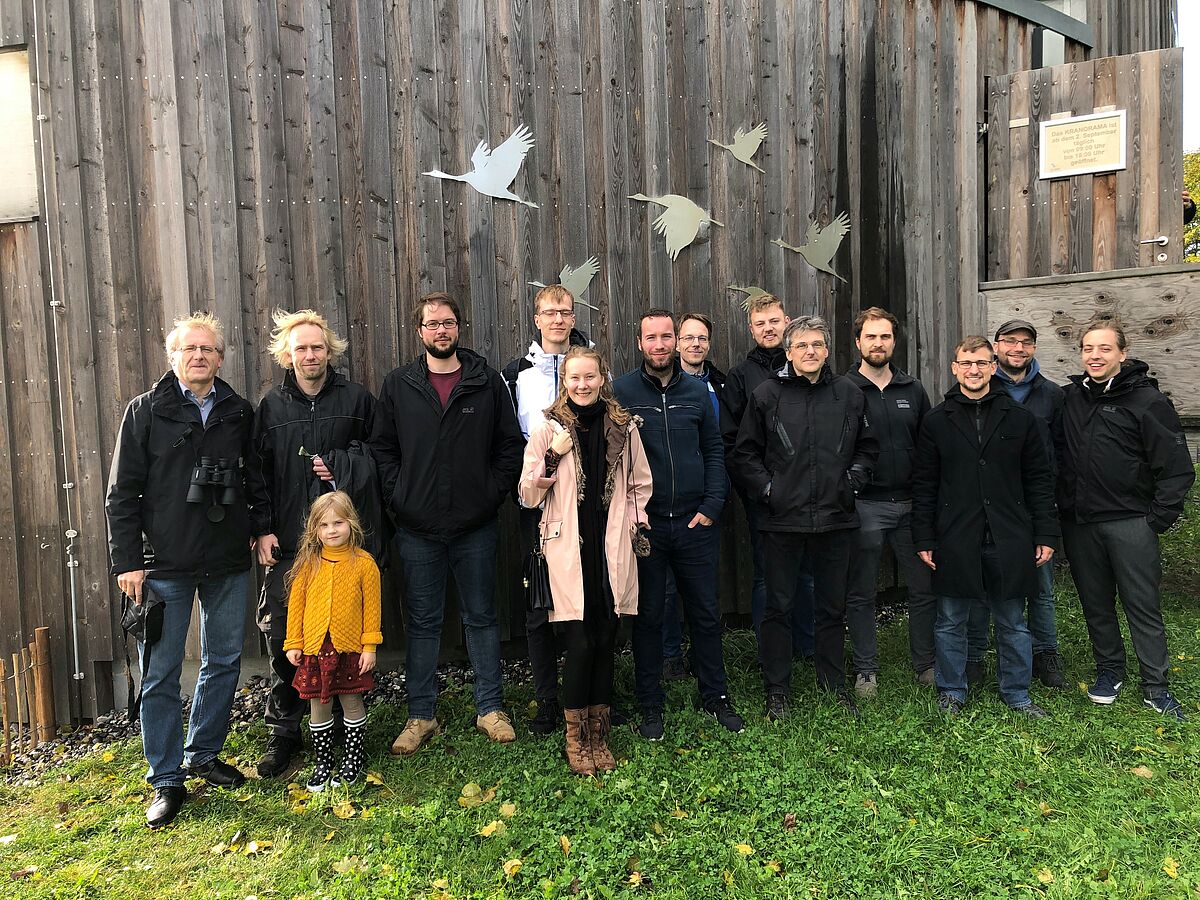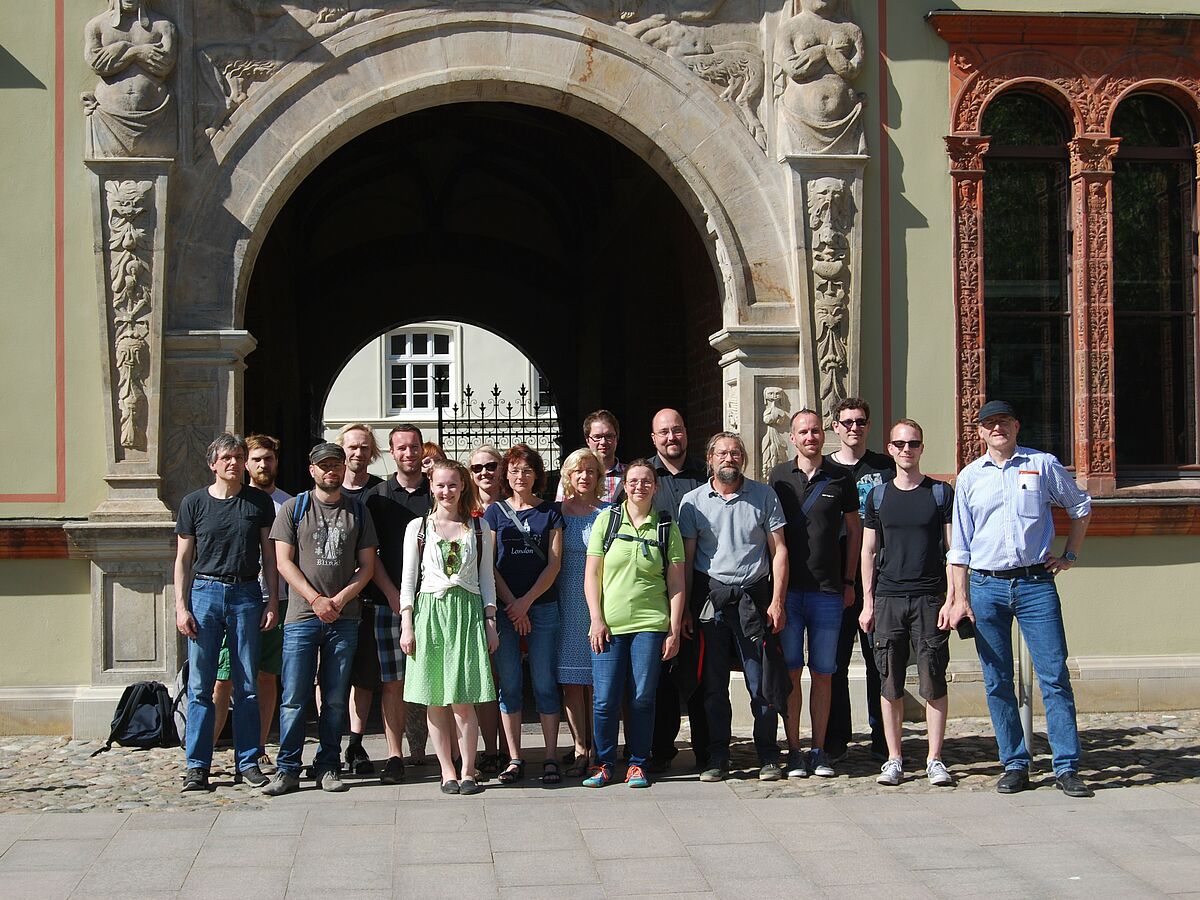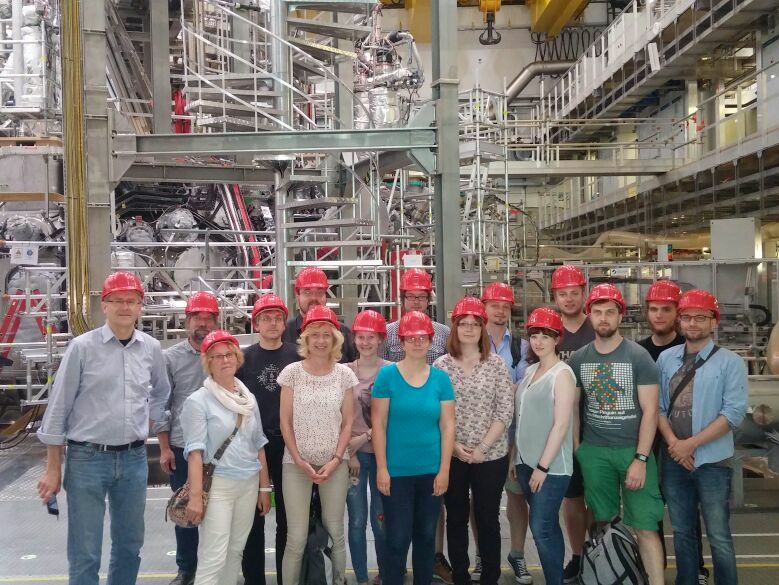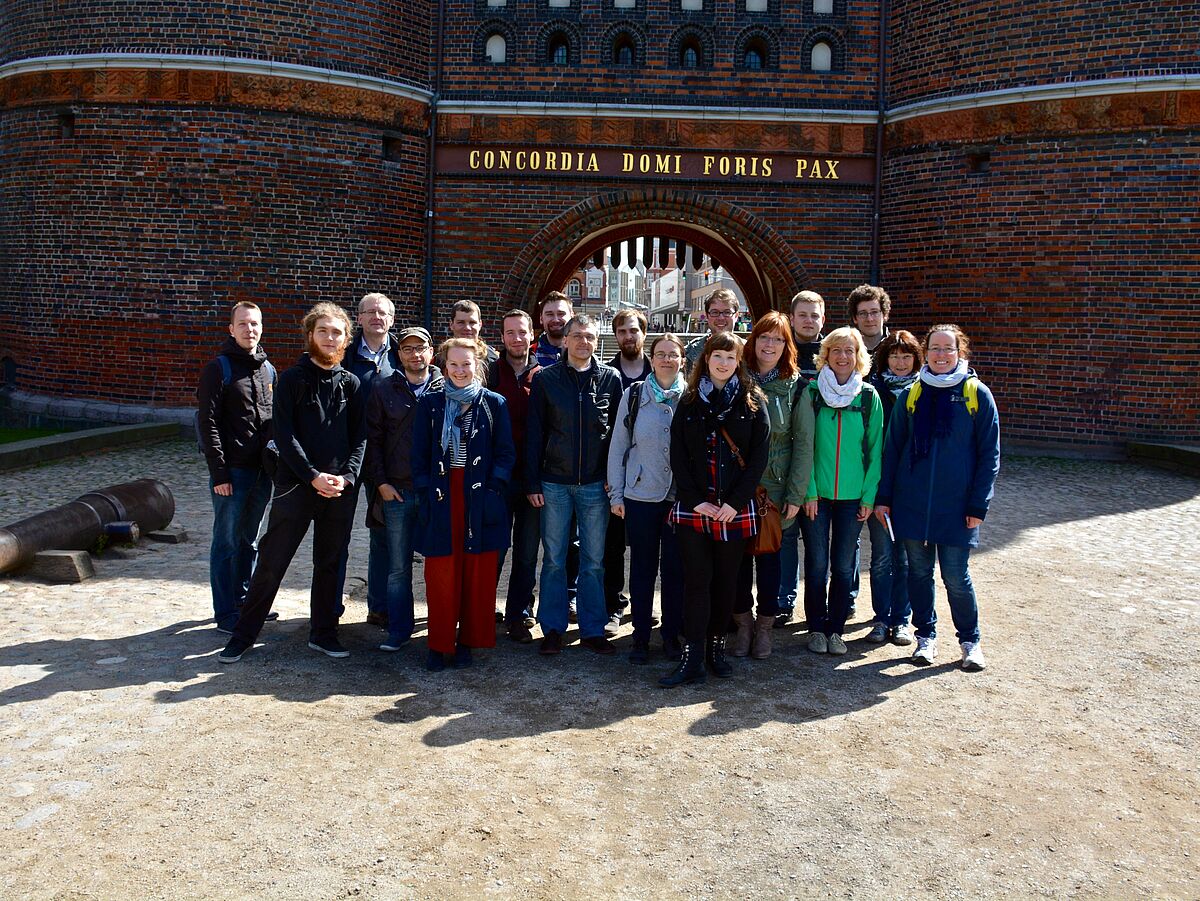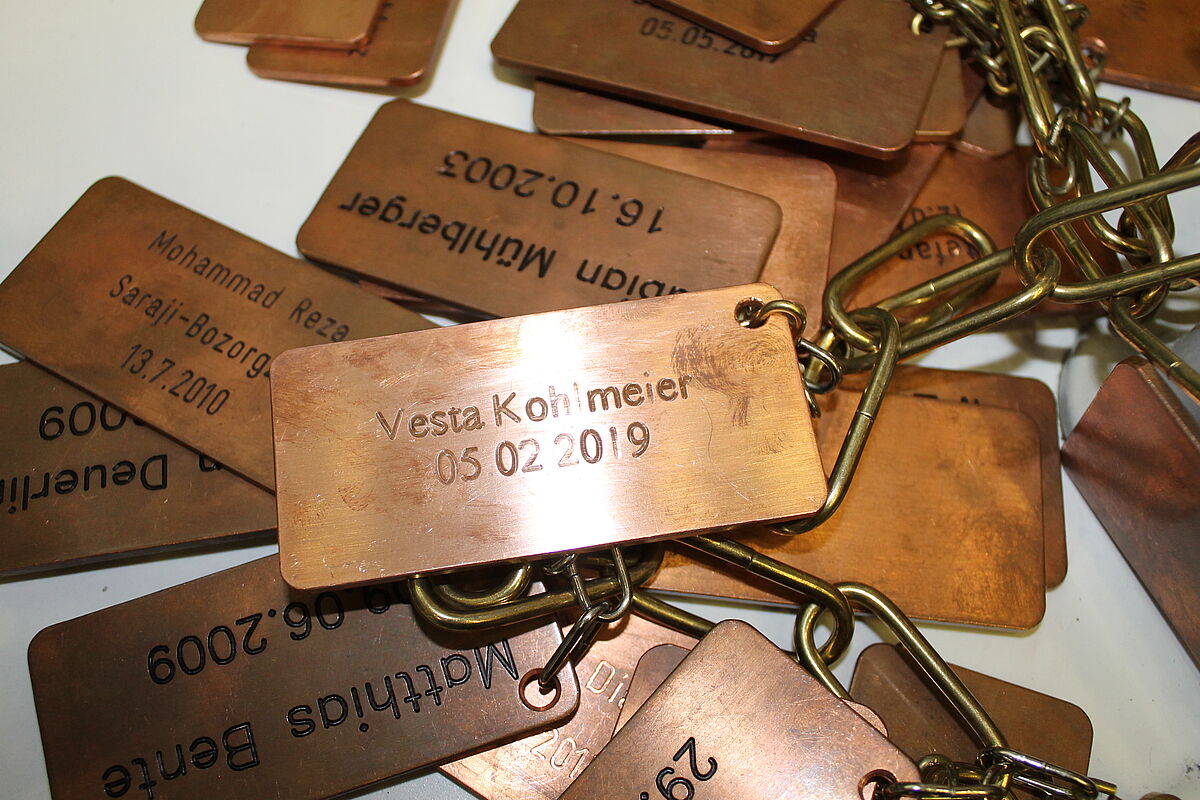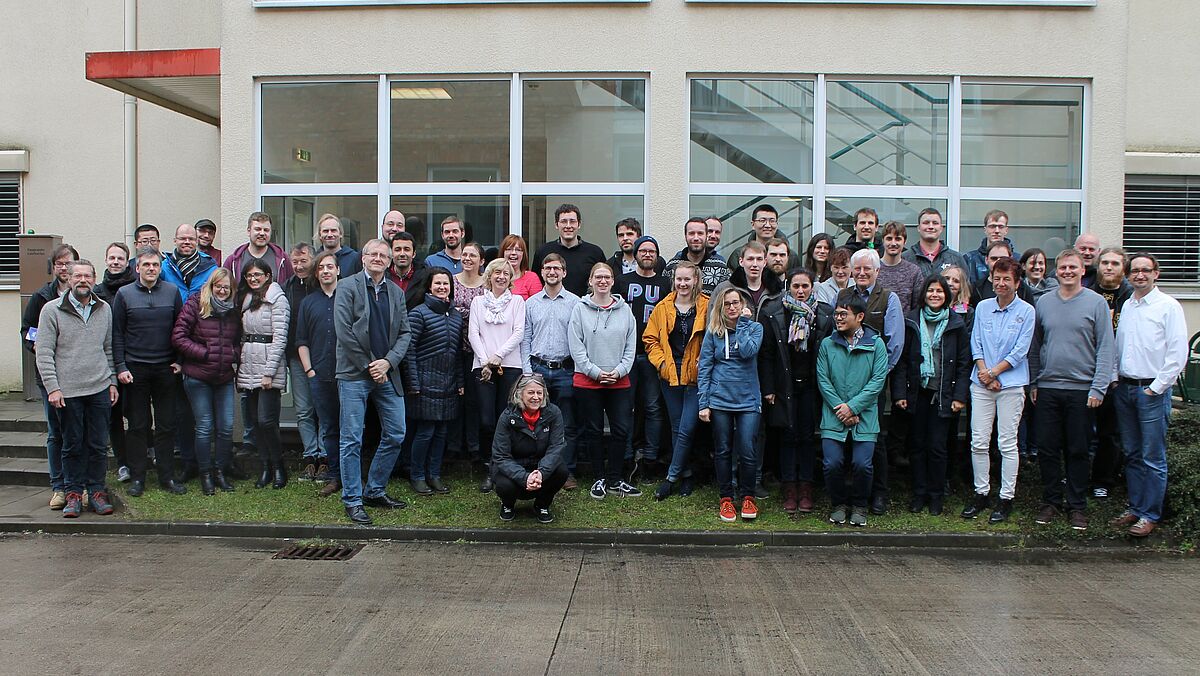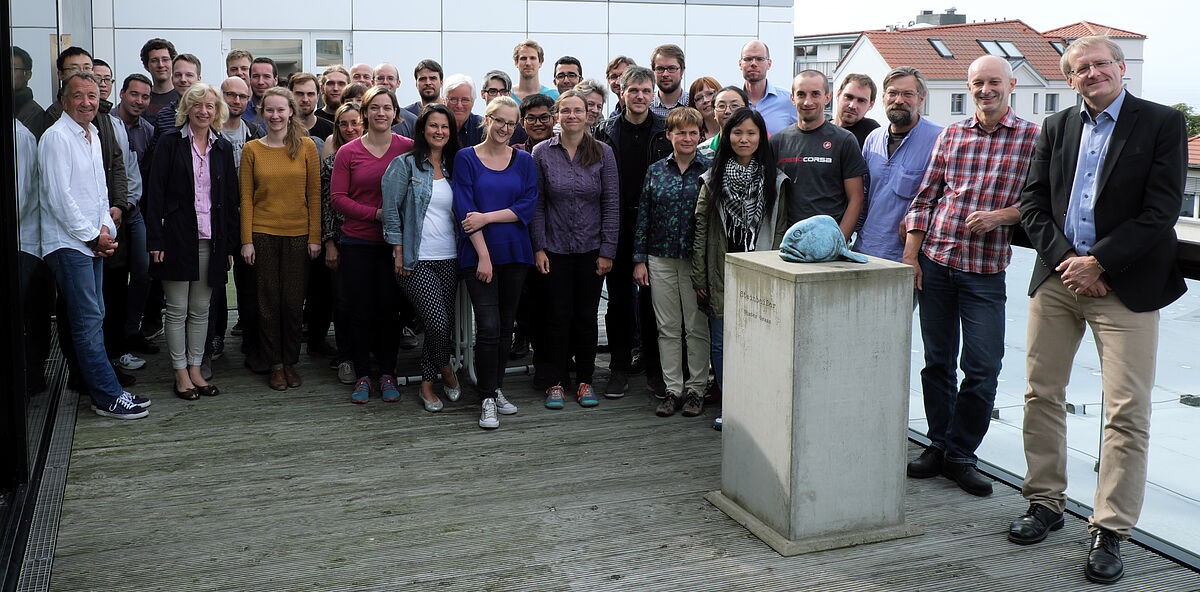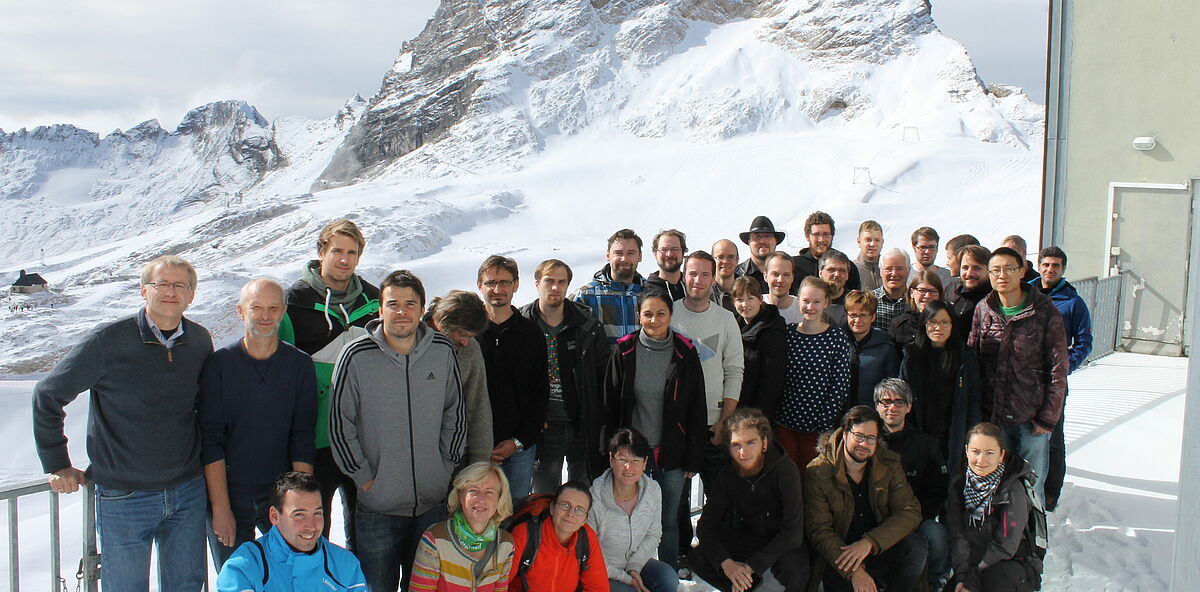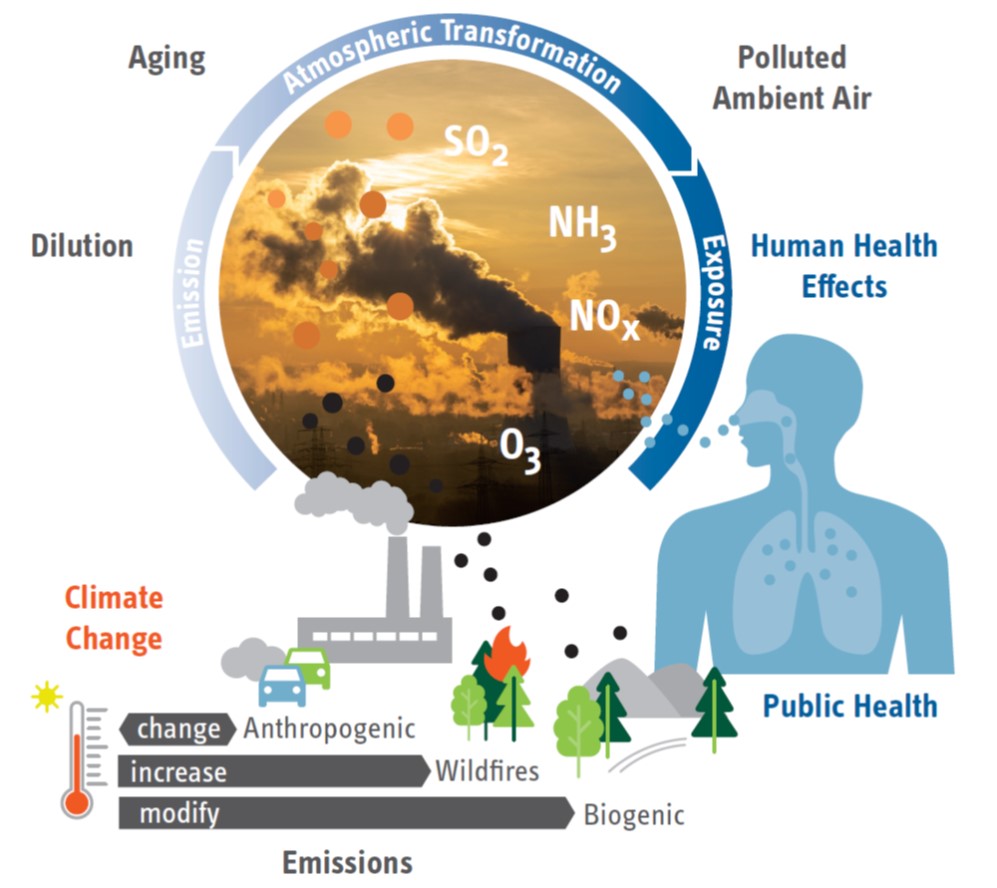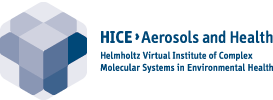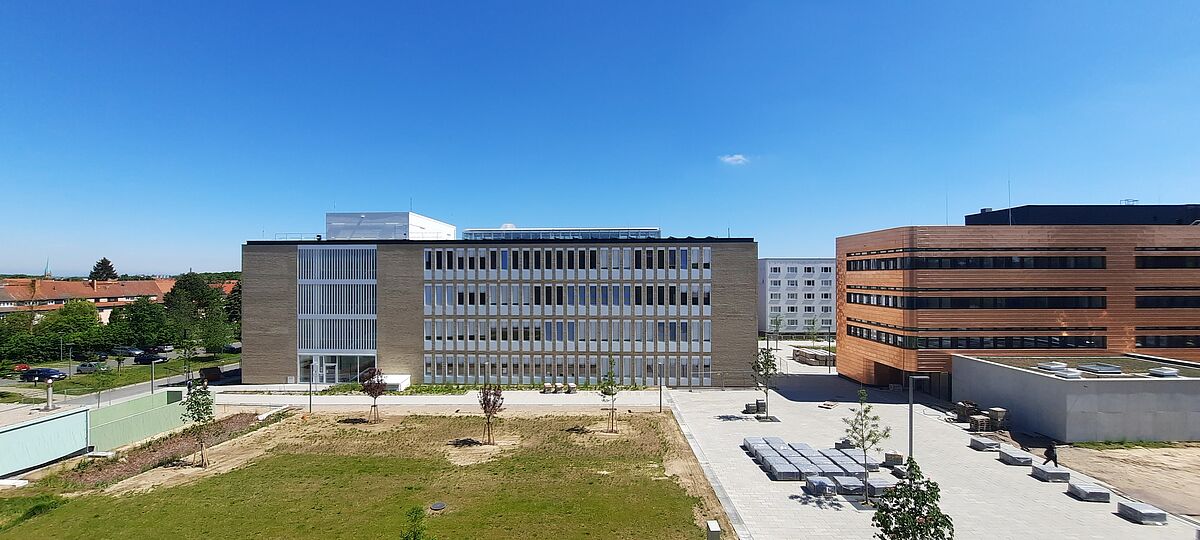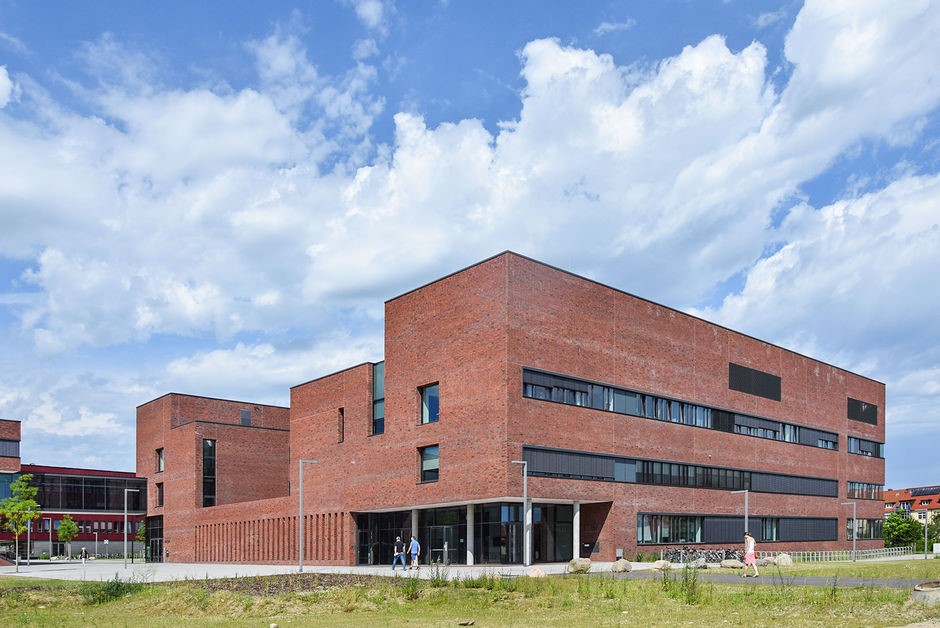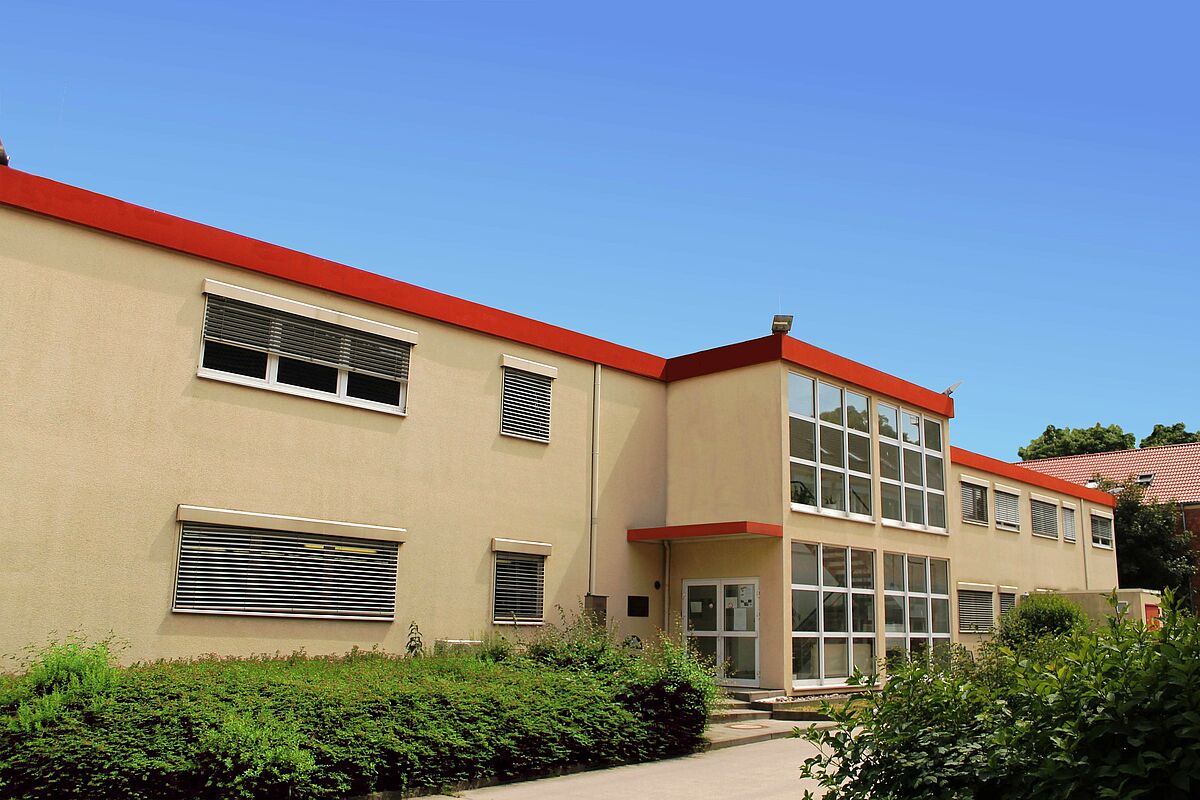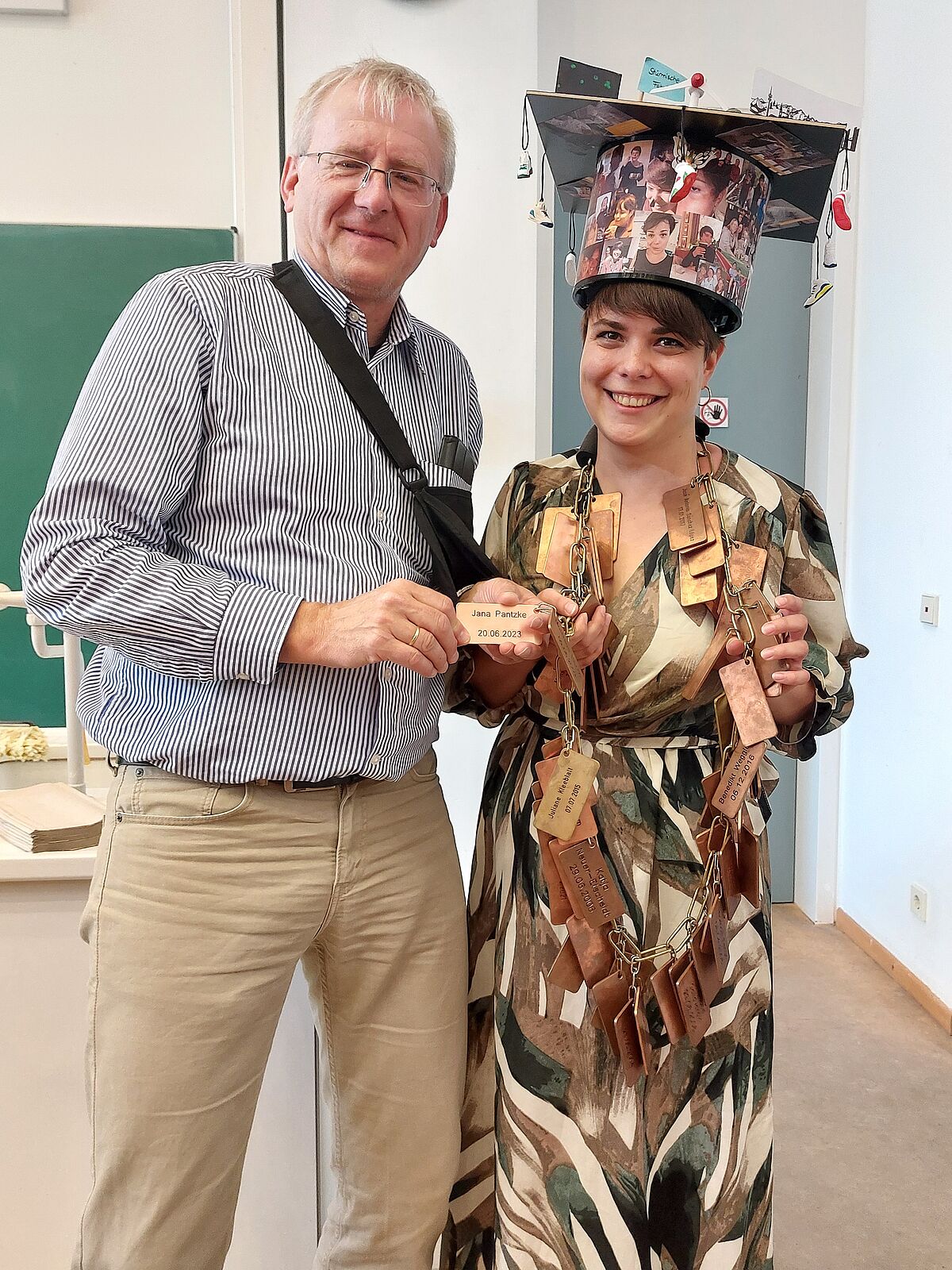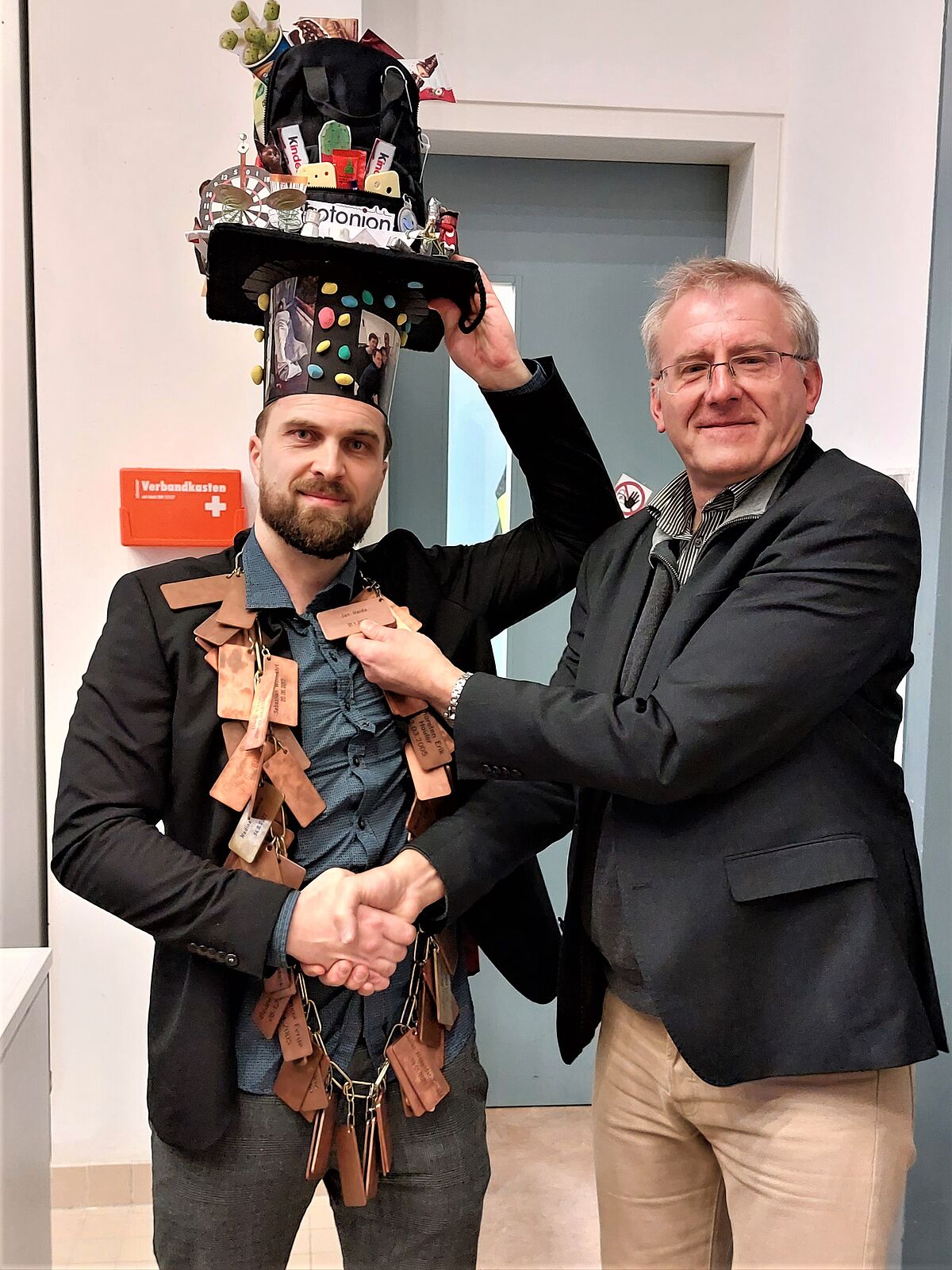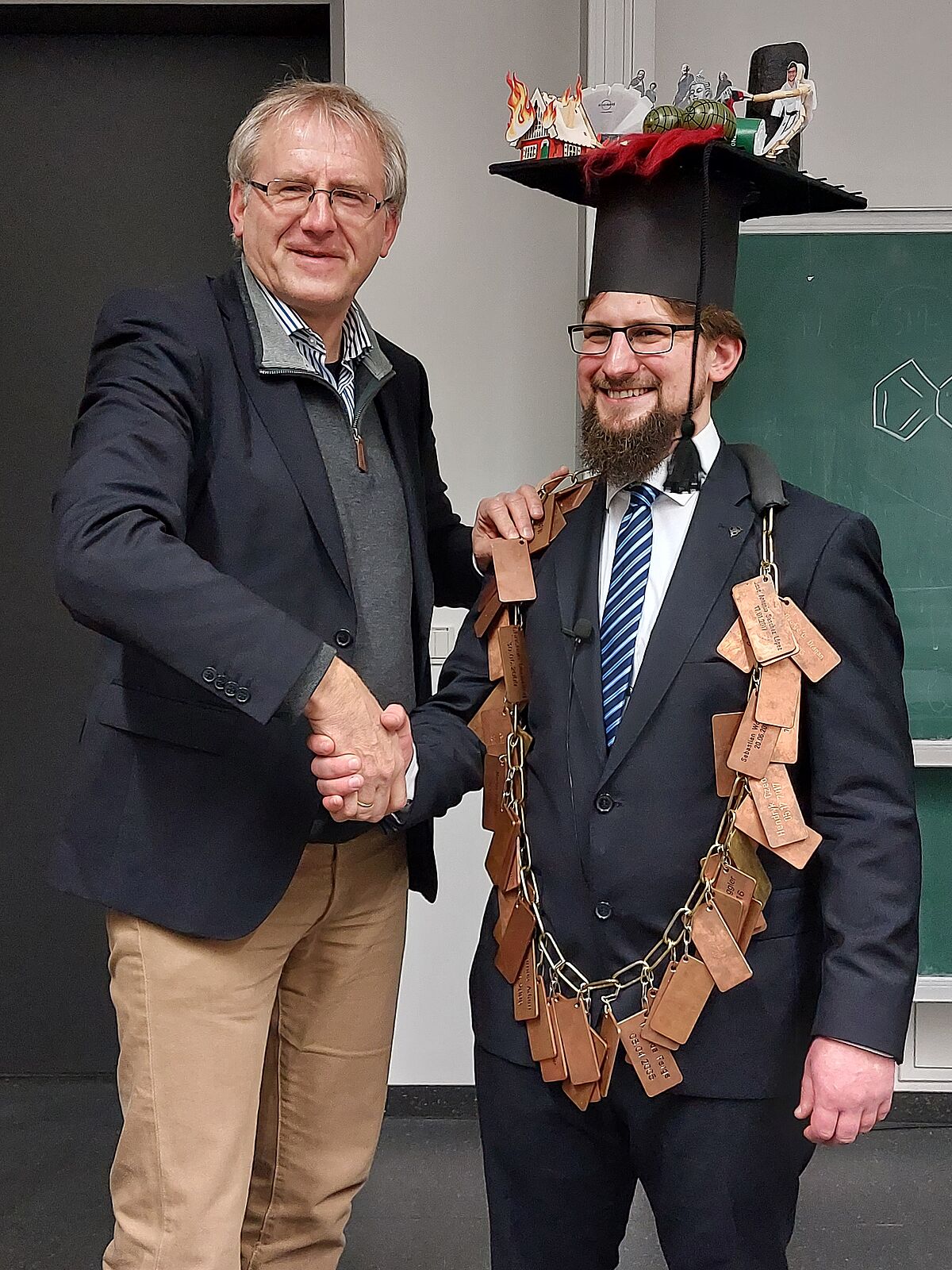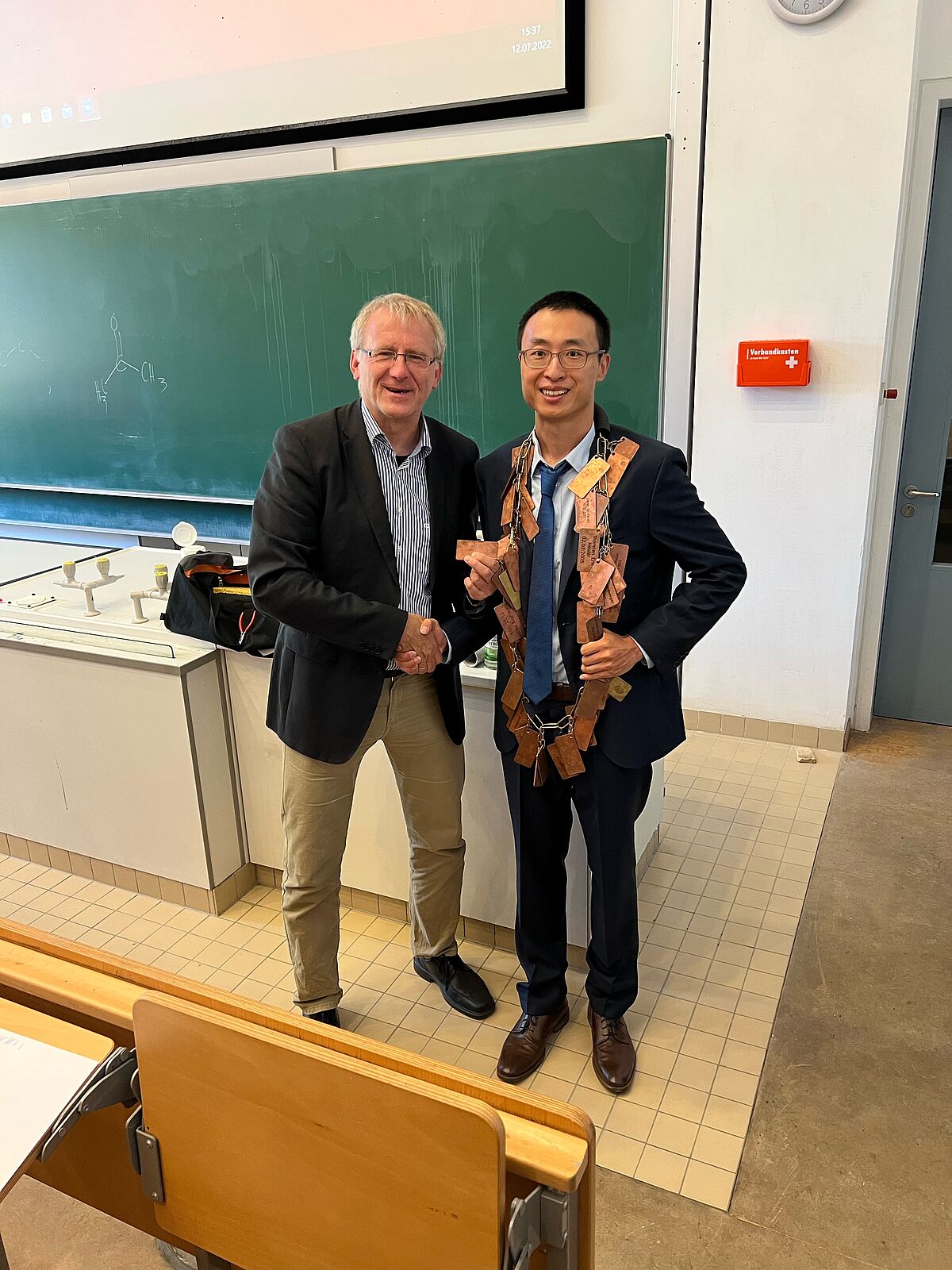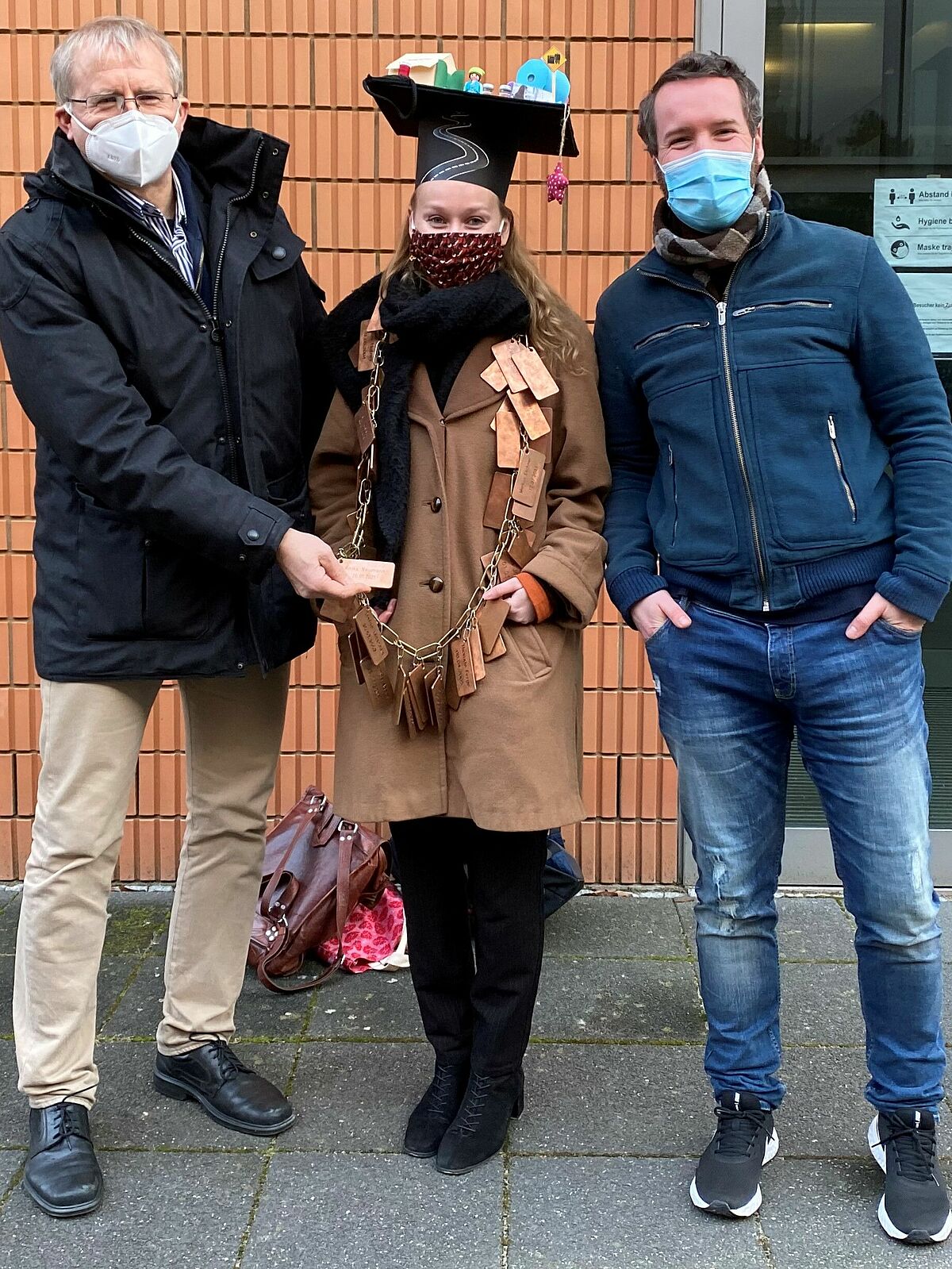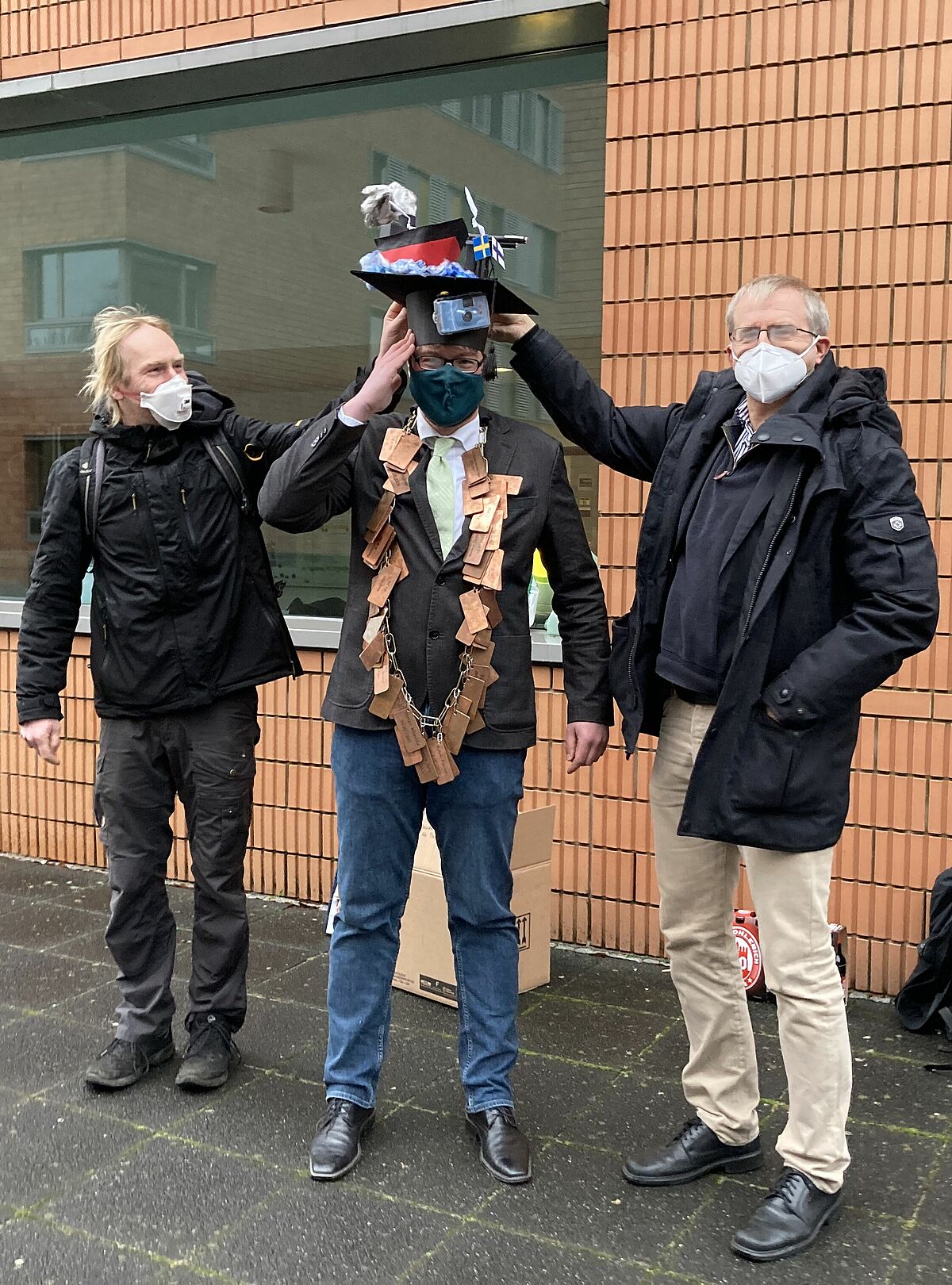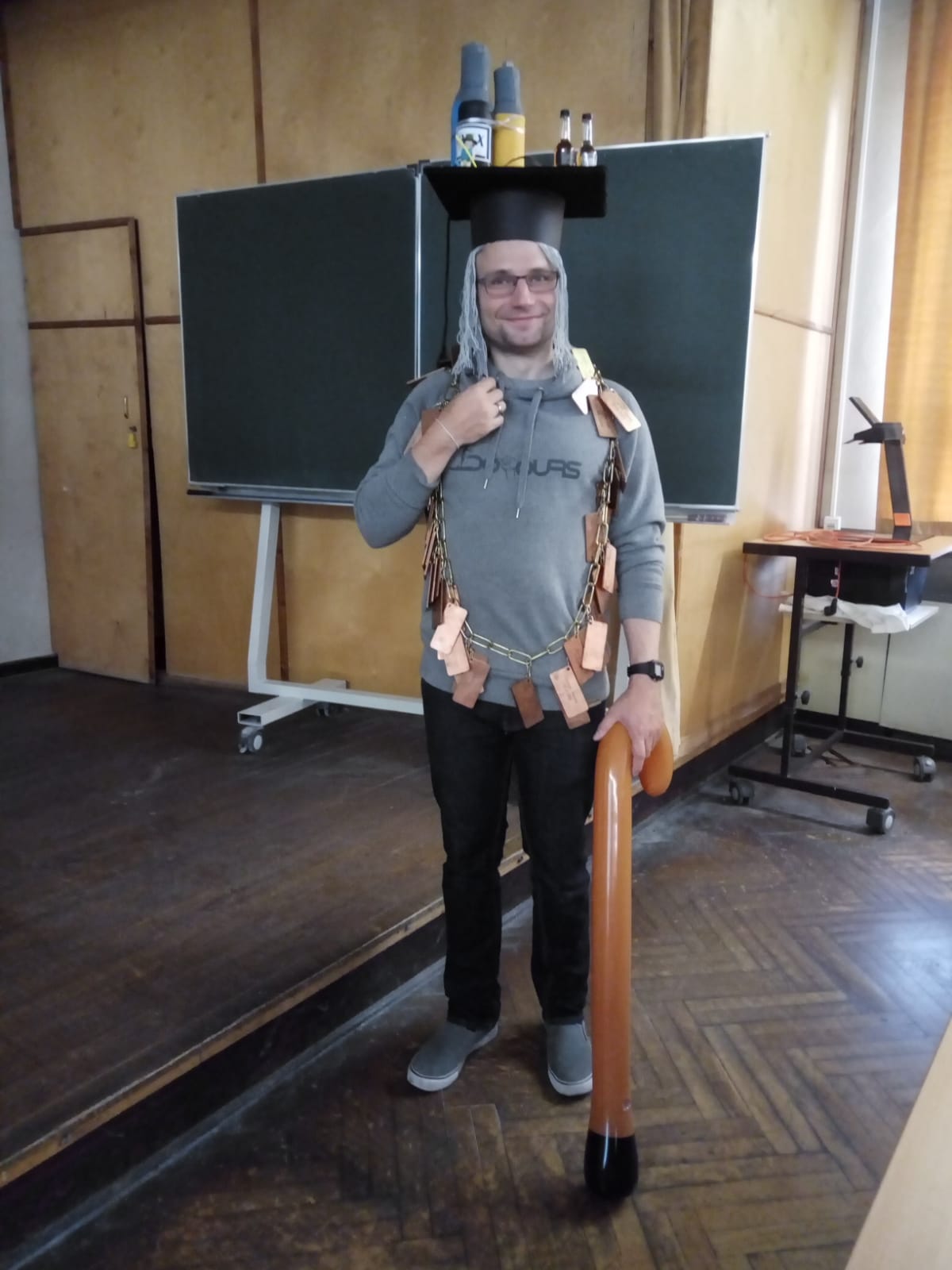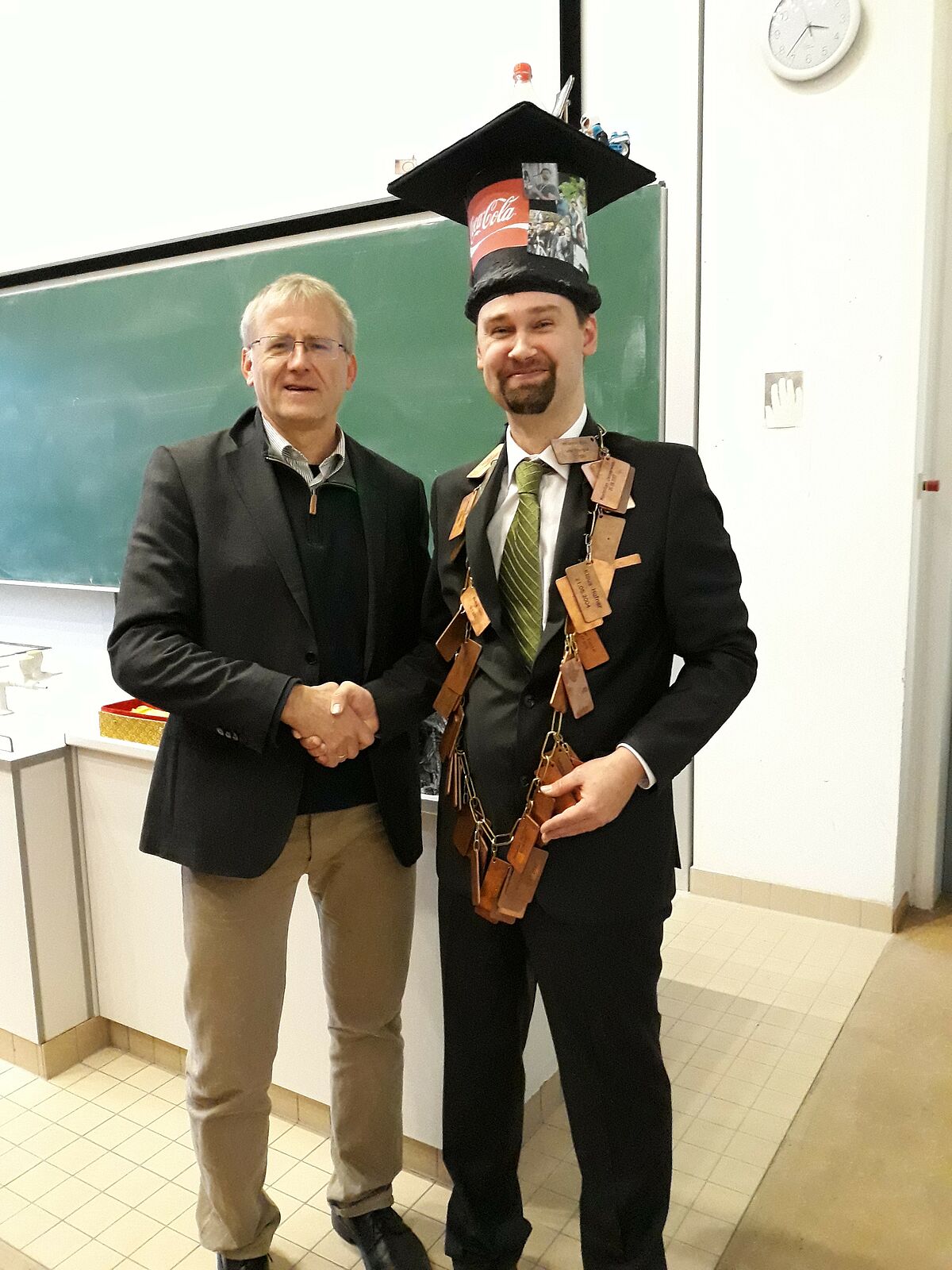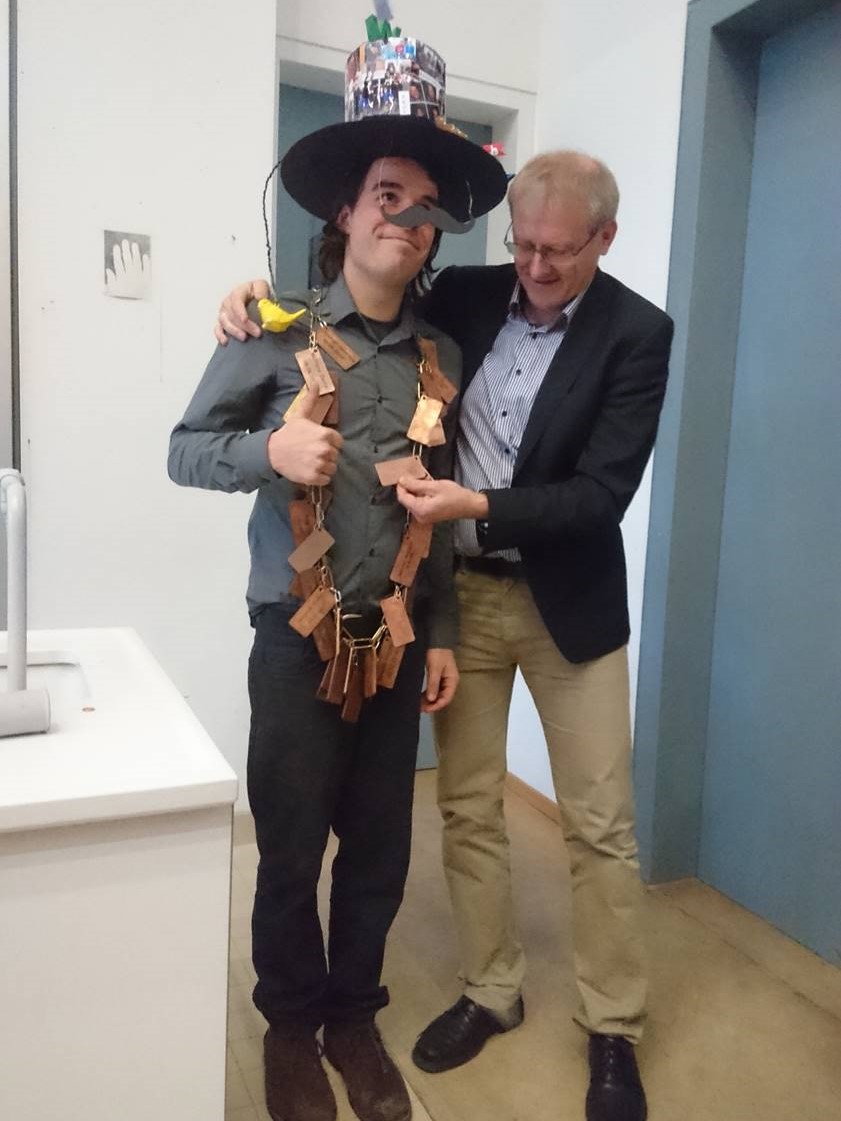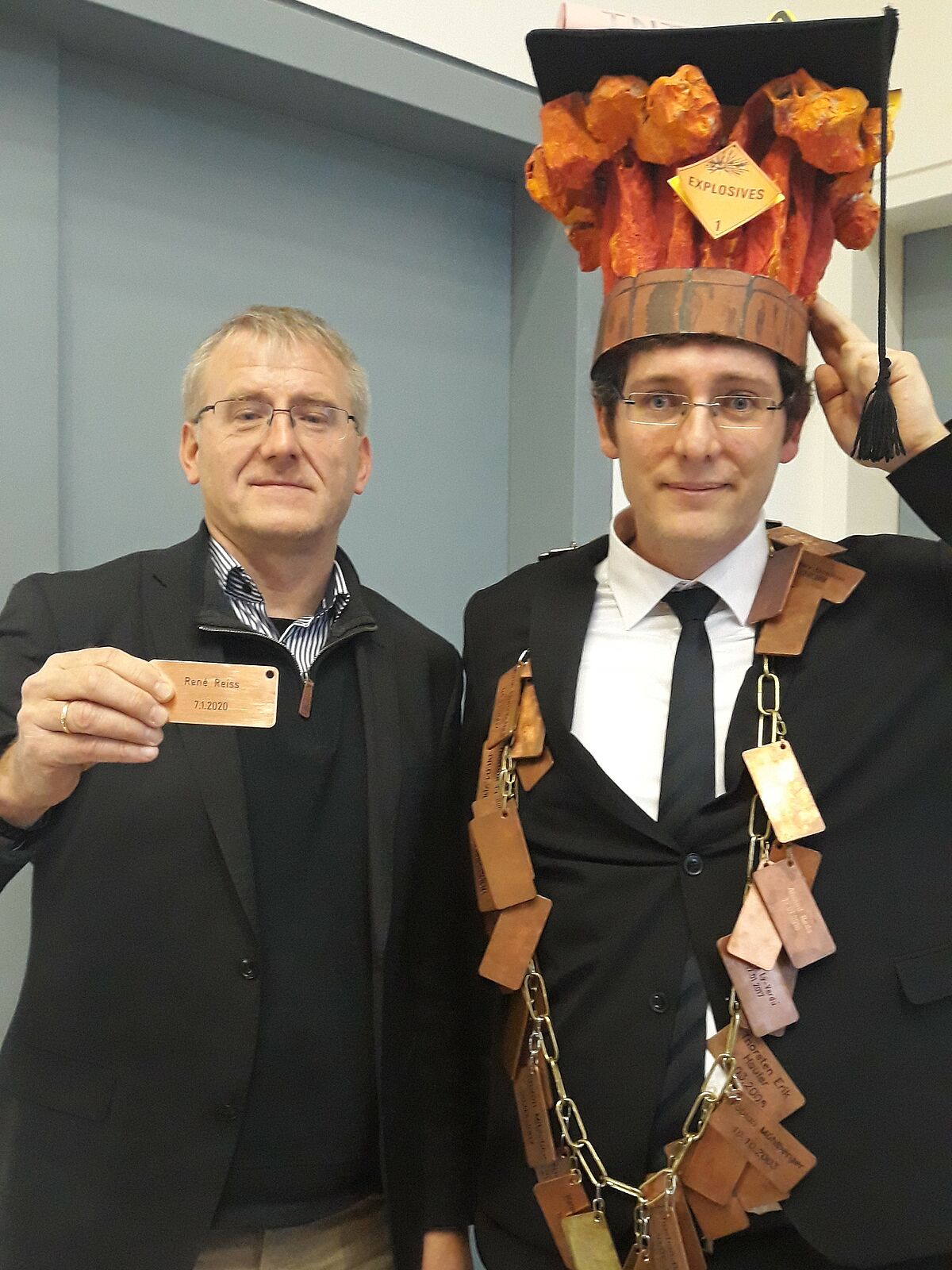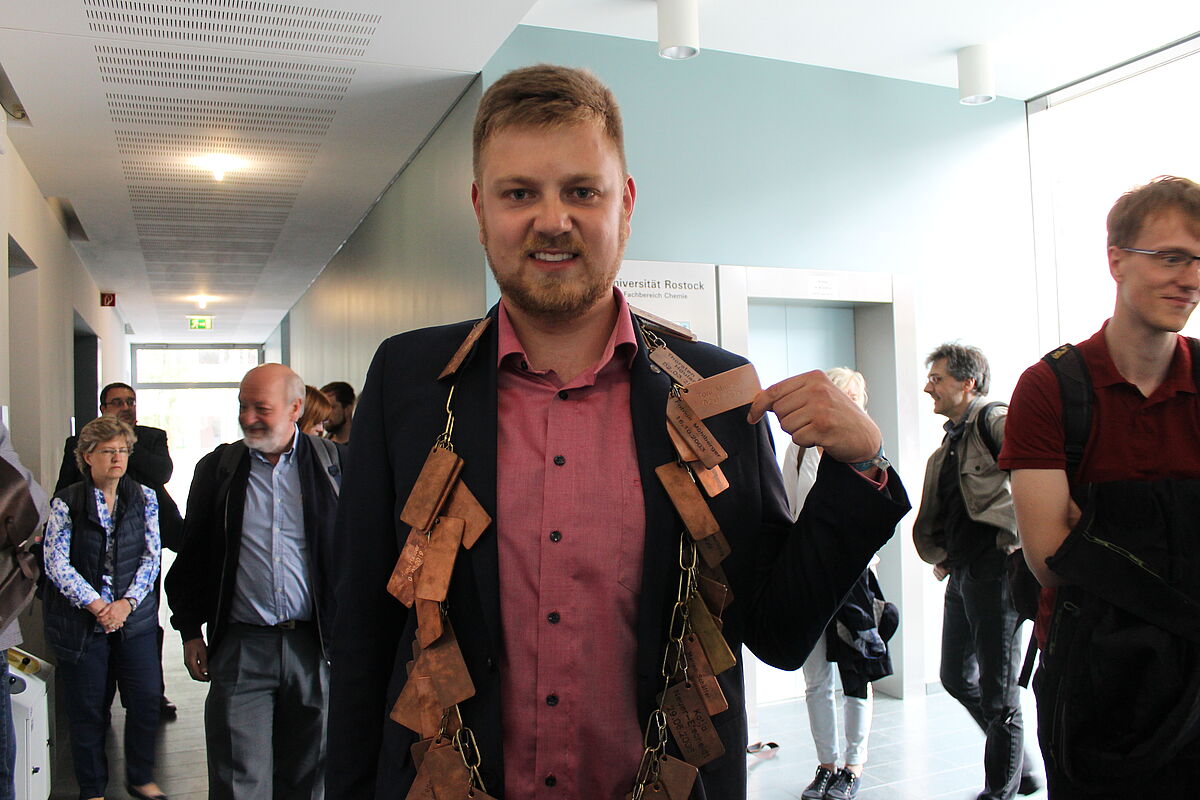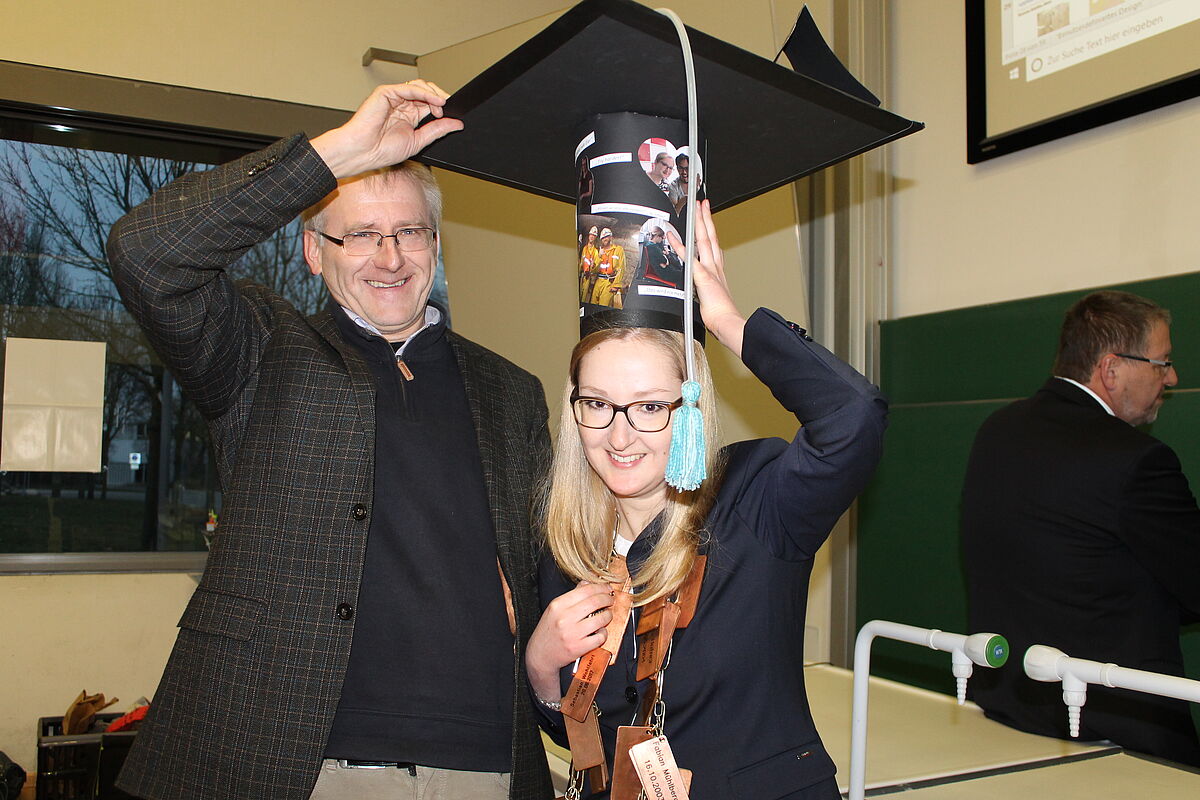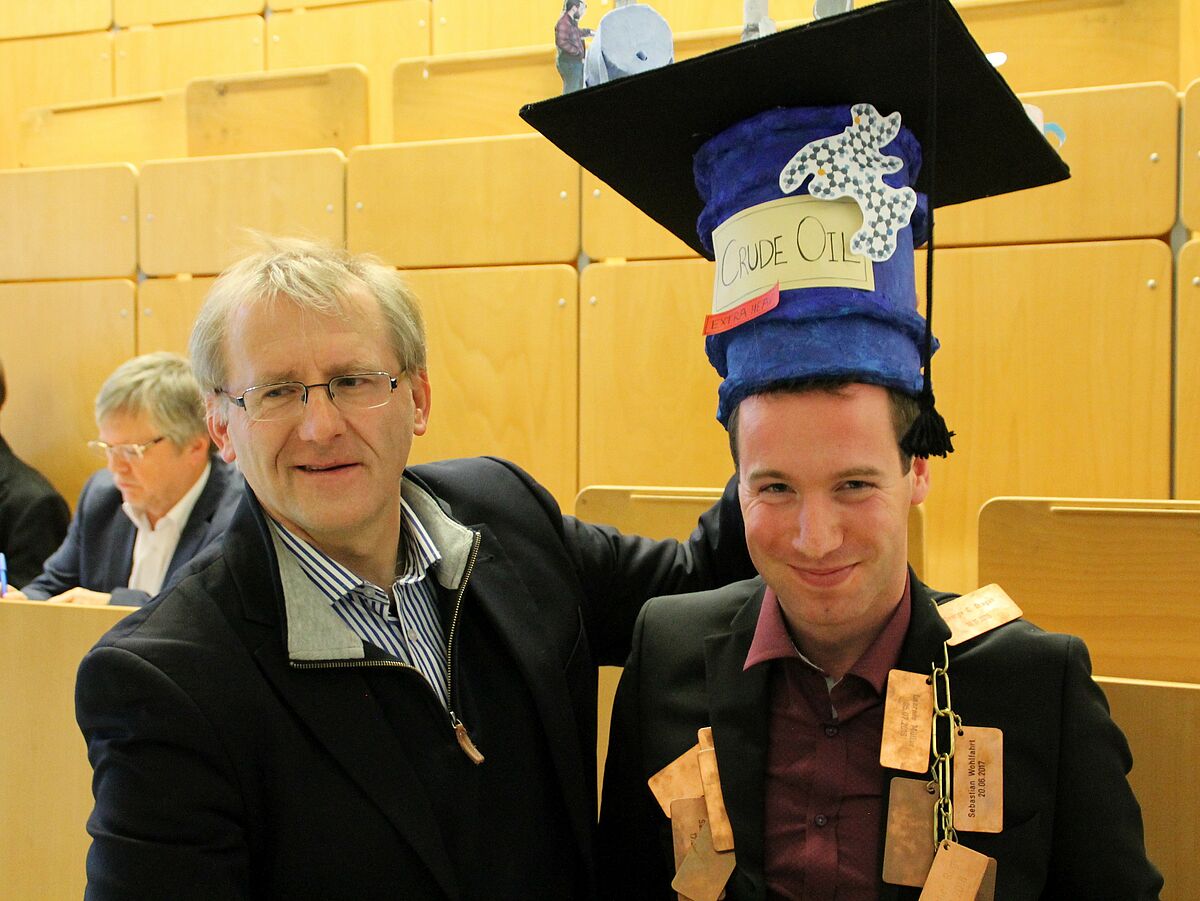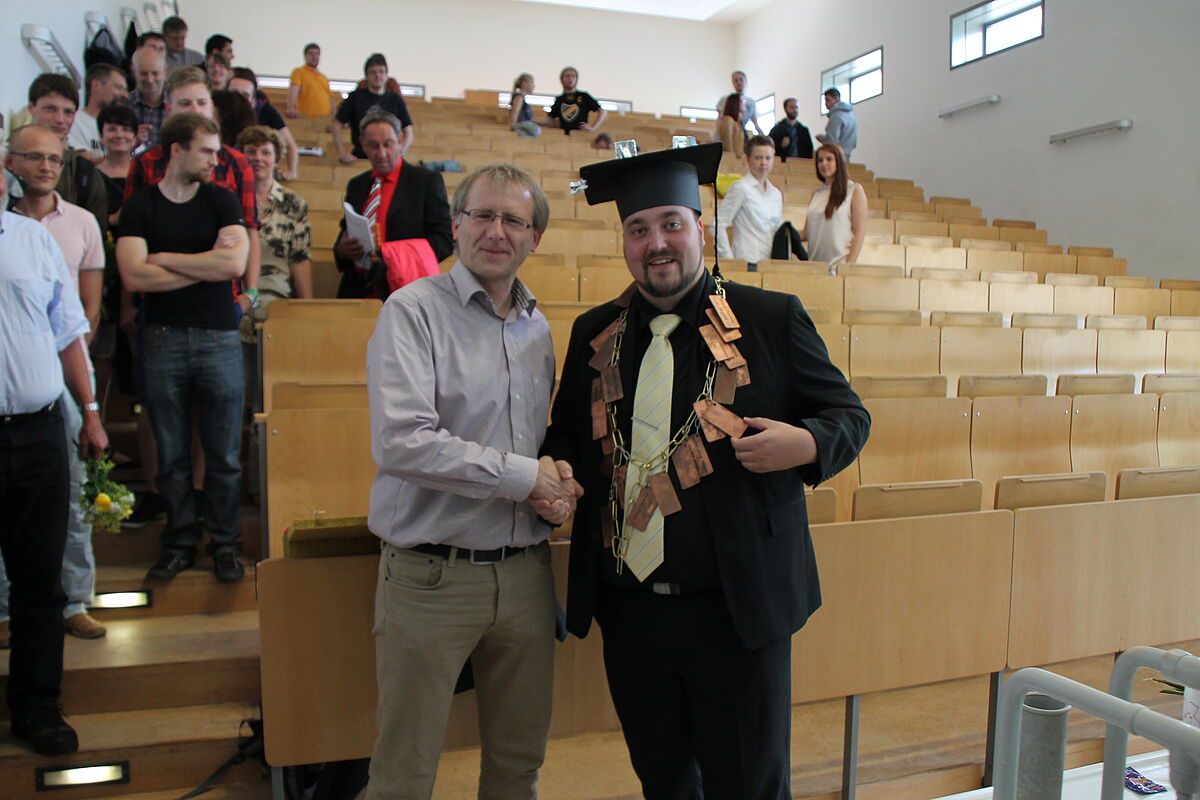About us
Welcome to the working group of Prof. Dr. Ralf Zimmermann!
Welcome to the working group of Professor Zimmermann! Here, mass spectrometry is the method of choice. In our group, you can find quadrupoles, time-of-flight systems as well as high resolution ion cyclotron resonance mass spectrometry. Besides the high important teaching part in general analytics, instrumental analytics and - of course - mass spectrometry, we have to main research areas: 1) The investigation of the effects of different aerosols on health as well as their chemical characterisation and 2) the development and application of new mass spectrometric methods for specific questions. In Rostock, these focus areas are conducted by three thematic groups:
Topic IV: Thermal analysis & photoionisation mass spectrometry (Leader: Dr. Thorsten Streibel)
Photoionisation by means of laser systems hyphenated to mass spectrometry has a long tradition in Rostock. Due to hyphenation of a thermal balance to photoionisation time of flight mass spectrometry, important information from evaporation and pyrolysis of solid samples can be gained.
Topic VII: Aerosol- & laser-mass spectrometry (Leader: Dr. Johannes Passig)
Which is the chemical compositions of single particles in the ambient air? This question is addressed by our second thematic group with the help of our aerosol time of flight mass spectrometer (ATOF). The organic composition of the particle’s shell as well as the chemical composition of the core of one single particle can be measured by this system!
Topic VII: Ultrahigh resolution mass spectrometry (Leader: Dr. Christopher Rüger)
High resolution mass spectrometry enables the assignment of individual sum formulae in complex mixtures because of its capability to determine the mass-to-charge ratio with high accuracy and its high mass resolution. In Rostock, we work on the further development of ionisation and fragmentation techniques as well as method development in the fields of Petroleomics and aerosol research.
Topic IX: aeroHEALTH & Data analysis (Leader: Dr. Hendryk Czech)
Aerosols are released into the atmosphere from biogenic and anthropogenic sources or generated by atmospheric processing (“ageing”) of volatile compounds. This topic comprises the characterisation of primary aerosols from combustion processes and their potential to form secondary aerosols upon ageing, which is investigated using smog chambers and oxidation flow reactors. Finally, the properties of aerosols of primary and secondary origin are linked to health effects in cooperation with the Cooperation Group “Comprehensive Molecular Analytics” at Helmholtz Centre Munich.
Topic X: Technology Transfer & Applications (Leader: Dr. Sven Ehlert)
Depending on the complexity and dynamics of the monitored chemical process, robust and powerful analytics is required in an industrial environment. Depending on the application and the research focus, different parameters as reaction kinetics, spatial or temporal resolution are of particular interest. We use photoionization mass spectrometry together with innovative sampling technologies to meet this challenge. The field of application ranges from the investigation of coffee roast gases, to the smoke / vapor from smoking products, to the detection of security-relevant substances.
Instrumental Analysis and Teaching Lab (Leader: Dr. Sabine Haack)
Contact
Universität Rostock
Institut für Chemie
Abteilung Analytische und Technische Chemie
Prof. Dr. Ralf Zimmermann
Sekretariat Christin Kühl
Albert-Einstein-Straße 27
18059 Rostock
Tel.: +49 (0) 381 498 - 6527
Fax: +49 (0) 381 498 - 118 6527
christin.kuehluni-rostockde
Since 2008, the chair of analytical chemistry of the University of Rostock cooperates with group "Analysis of Complex Molecular Systems" (CMA) of the Helmholtz Zentrum Munich (HMGU) in the area of the development and application of mass spectrometric techniques for the characterisation of complex molecular mixtures. The "Joint Mass Spectrometry Centre" which arose from this cooperation is headed by Prof. Ralf Zimmermann. Prof. Zimmermann has both the chair of Analytical Chemistry at the University of Rostock and the leadership of our cooperation group at the HMGU.
At both locations, the JMSC work in two research areas: On the one hand, we work on Aerosols and Environmental Health, and on the other hand, we work on the development and application of mass spectrometric techniques. Both research areas are subdivided and researchers from both locations work on it.
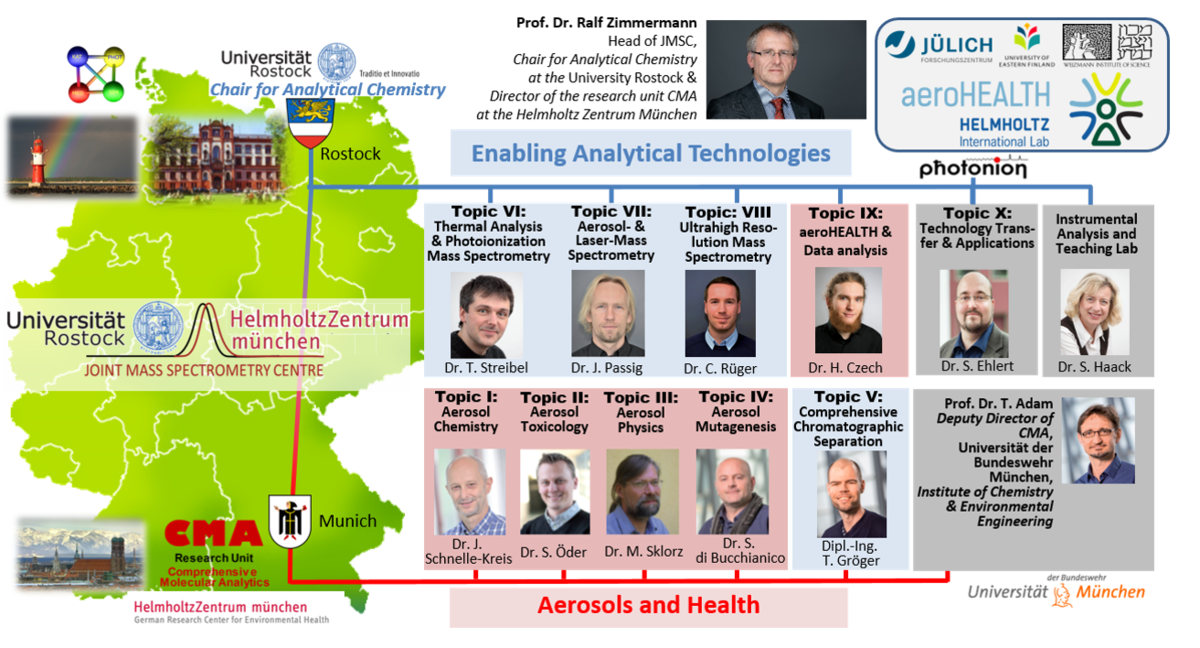
Since 2012, the cooperation strengthened due to the establishment of the virtual Helmholtz Institute „Complex Molecular Systems in Environmental Health - Aerosols and Health (HICE)”. The research foci of this 5-year project were 1) the elucidation of the molecular mechanism in combustion aerosols, which are relevant for health effects, 2) the identification of bio markers of expostion and health effects, and 3) the evaluation of the relevant toxicological potential of varios anthropogenic sources. The project HICE was composed of an international research consortium with 8 partners. After the end of the HICE project, the ideas of HICE are now implemented in a variety of new projects of our group.
One focus of research at the JMSC is the field of aerosols. From the formation from combustion engines of ships or cars to the combustion of biomass for heating or from forest fires, a wide variety of emission sources are analysed. Another topic is the aging of these emissions, taking into account complex atmospheric chemistry and the negative effects on human health.
Locations
At the University of Rostock, the JMSC is represented by the Chair of Analytical Chemistry, which is located in buildings of the University of Rostock in the Albert-Einstein-Straße 27 and the competence Centre “Mass Spectrometry” in the new Research Building of the “Life, Light & Matter Department of the Interdisciplinary Faculty (LLM, Albert Einstein Straße 25, figure 2).
Department Life, Light & Matter
In 2007 the University of Rostock established its 10th Faculty, the Interdisciplinary Faculty (INF). Within the INF, research is organized and focused in four overarching research fields, organized in a Department structure. The Departments of the INF currently are:
- Department Life, Light & Matter (LLM)
- Department Maritime Systems (MTS)
- Department Aging of Individuals and Society (AGIS)
- Department Knowledge – Culture ─ Transformation (WKT)
By institutionalizing this thematic concentration and cross-subject and discipline cooperation, the university breaks new ground and connects the new structure with a clear vision, intending to bundle and enhance comprehensive expertise related to these topics. The Department Life, Light, and Matter (LLM), currently led by Prof. Zimmermann, was established as a focal point between natural and engineering sciences and medicine. In 2008 a proposal for an LLM-Research Building to the German Council of Science (state/federal funding scheme) was worked out by a professorial consortium under the direction of Prof. Dr. Meiwes-Broer and with the participation of Prof. Dr. Zimmermann. The proposal was finally granted and in 2015 the new research building of the department LLM (see figure 2) was inaugurated. The LLM research building comprises of project laboratories and five competence centers: Interfaces and Surfaces; Microscopy and Spectroscopy; Calorimetry and Thermal Analysis Methods; Nuclear Magnetic Resonance Spectroscopy; and Mass Spectrometry. This modern building allows scientists from diverse scientific areas to conduct cooperative and cutting-edge research on over 2500 square meters of excellently equipped laboratories. The five competence centers house large-scale equipment and facilities, some of which are unique, such as a high-performance electron microscope successfully funded in 2017. Figure 14 shows a sketch of the current LLM structure, including the competence centers in the LLM research building.
The JMSC, led by Prof. Dr. Ralf Zimmermann, is heading the competence center Mass Spectrometry at the LLM research building with the vision to bring together high-performance mass spectrometric instrumentation. Currently, more than ten members of the JMSC, including eight PhD-students, are working in the framework of the competence center Mass Spectrometry in various research projects. Five research laboratory rooms, organized in the Ultra-High Resolution and Routine Mass Spectrometry Laboratory (HRMS) and the Laser and Aerosol Mass Spectrometry Laboratory(LAMS) are used by the competence center Mass Spectrometry. Unique mass spectrometric platforms are operated, including two single-particle time-of-flight mass spectrometer, and one Aerodyne aerosol mass spectrometer and an fs-laser - mass spectrometry system (LAMS: Topic VI, Dr. Johannes Passig), as well as an ultrahigh-resolution Fourier transform ion cyclotron resonance mass spectrometer (FT-ICR MS), and two Orbitrap high-resolution mass spectrometer (HRMS: Topic VIII, Dr. Christopher P. Rüger). Moreover, routine chromatographic mass spectrometric systems are maintained, such as liquid and gas chromatography.
Picture gallery of our alumni
List of our alumni
2025
- Dr. Lukas Anders
- Dr. Carsten Neukirchen
- Dr. Andreas Paul
2024
- Dr. Elias Zimmermann
- Dr. Lukas Schwalb
- Dr. Eric Schneider
2023
- Dr. Lukas Friederici
- Dr. Seongho Jeong
- Jana Pantzke
- Dr. Arne Koch
- Dr. Jan Heide
- Dr. Stefanie Binder
2022
- Dr. Xin Cao
- Dr. Xiansheng Liu
- Dr. Nadine Gawlitta
- Dr. Xiao Wu
2021
- Dr. Anika Neumann
- Dr. Julian Schade
- Dr. Christoph Grimmer
2020
- Dr. Theo Schwermer
- Dr. Uwe Käfer
- Dr. Sascha Münster-Müller
- Dr. René Reiss
- Dr. Christian Gehm
2019
- Dr. Toni Miersch
- Dr. Frank Hauser
- Dr. Vesta Kohlmeier
2018
- Dr. Fengxia Li
- Dr. Christopher Rüger
- Dr. Tamara Kanashova
2017
- Dr. Maximilian Jennerwein
- Dr. Hendryk Czech
- Dr. Sebastian Wohlfahrt
- Dr. Saray Ly Verdú
- Dr. José Antonio Sánchez López
2016
- Dr. Beate Gruber
- Dr. Benedikt Alexander Weggler
- Dr. Michael Fischer
- Dr. Stefan Otto
- Dr. Laarnie Mueller
- Dr. Ahmed Abd Alhadi Reda
2015
- Dr. Jana Diab
- Dr. Christa Dumrath
- Dr. Constantin George Dragan
- Dr. Juliane Kleeblatt
2014
- Dr. Raeed Megeed Qadir
- Dr. Sven Ehlert
- Dr. Marion Schäffer
- Dr. Phillip Trefz
2013
- Dr. Michael Elsasser
- Dr. Romy Hertz-Schünemann
- Dr. David Meyer
- Dr. Jürgen Orasche
- Dr. Alois Fendt
2012
2011
- Dr. Markus Eschner
- Dr. Sebastian Dresen
2010
- Dr. Werner Welthagen
- Dr. Mohammad Reza Saraji-Bozorgzad
- Dr. Maren Mieth
2009
- Dr. Elisabeth Schramm
- Dr. Matthias Bente
- Dr. Christian Deuerling

